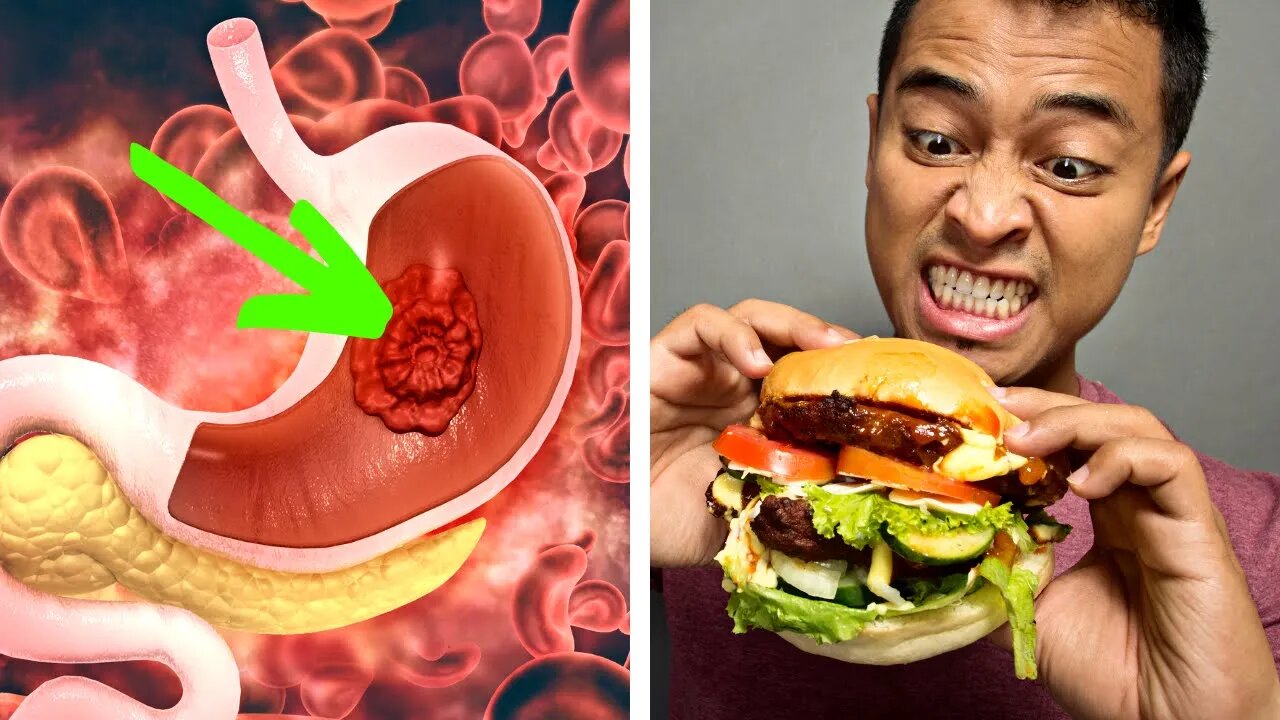Premium Only Content

5 Very Real Dangers of Overeating
Christmas is coming, and I want to ask you a question: do you know why we still feel hungry after eating all that food from a Christmas supper? Is it true that eating too much "expands" the stomach and that it means you have more space for eating the next day?
The answer is that, for most people, you don't feel hungry despite the huge amounts of food you ate. You feel hungry because of how much you ate. And Christmas isn't the only time for it to happen.
Although most don't know it, compulsive eating is the most common eating disorder in adults. Did you know that?
Now, let's see some of the negative consequences of overeating:
You get restless
The common belief is that we get sleepy after overeating but, the truth is that after eating big amounts of food, you can feel restless and sleepless.
Binge eating can deregulate your circadian clock, which is responsible for helping the body release sleep-inducing hormones. In addition, if the foods ingested are rich in carbs (like pasta or cakes), even if you sleep at the right time, you will probably wake up hungry when your sugar levels drop.
The best way of avoiding it is to have your last meal of the day 3 hours before going to bed.
You get nauseated
The chances are high that you have trouble sleeping after eating more than necessary, and nausea is another symptom that you can have. To digest food, the metabolism and the heart rate accelerate.
To feel more comfortable, drink plenty of liquids and rest until the sickness stops.
You get stomach gas
Whenever you eat, you swallow some air with your foods. And the more you eat, the more air you swallow. This air ingestion can increase if you drink sparkling water or soda during your meal. On top of that, the body produces gas during digestion. So, until all this air finds an exit, you may feel uncomfortable.
To avoid it, or at least to reduce how much air gets into your stomach, make sure to eat slowly and chew your foods well. And avoid drinking while eating.
But, if you suddenly feel bloated, a quick walk can help release all the gas in your stomach.
Your heart rate will increase
If you eat more than you are used to, your metabolism will go crazy. The heart rate increases and you start sweating a lot as if you were in a sauna.
Sadly, there isn't anything you can do to interrupt this overload in your metabolism. Once it ends, everything will go back to normal. But you can try taking a cold shower to feel a little better.
Your stomach changes
The foods you eat should give you energy, and any excess should leave your body. This process is known as digestion. So, when you overeat, the body has to work more. It can cause more frequent bowel movements and even lead to diarrhea. Did you know that?
Besides, the way you eat has consequences. Eating slowly and chewing well is key for avoiding this situation, although refraining from excesses is still the best solution.
If you face this issue, don't forget to hydrate your body, as a lot of water is lost during the process. Coconut water can be a good idea in these cases.
Your belly will expand
The most noticeable change is an increase in the size of your belly. You might think your pants shrunk, but it's actually your stomach that got bigger! Once the food is digested, your stomach returns to its original size.
The easiest way to avoid this is to eat slowly. It not only allows you to enjoy the food but also gives your brain time enough to notice when it is satisfied - a signal for you to stop eating.
Start being more mindful of your meals. Eat at the table with your family and turn off any electronic devices that can steal your attention; focus on being present in the moment and observing your plate and body.
Do you overeat? How many times have you gone overboard?
Follow us on:
Facebook - https://bit.ly/38BWbw3
Pinterest - https://bit.ly/2Irvwa6
---------------------------------------
Disclaimer: The materials and the information contained on Natural Cures channel are provided for general and educational purposes only and do not constitute any legal, medical or other professional advice on any subject matter. These statements have not been evaluated by the FDA and are not intended to diagnose, treat or cure any disease. Always seek the advice of your physician or other qualified health provider prior to starting any new diet or treatment and with any questions you may have regarding a medical condition. If you have or suspect that you have a medical problem, promptly contact your health care provider.
-
 4:11
4:11
Natural Cures
1 year ago $1.06 earned7 Proven Foods to Unclog Arteries Naturally
4.06K -
 DVR
DVR
Rebel News
1 hour ago $0.81 earnedLibs push more censorship, Carney's ties to 'largest tax scam', CCP influence in BC | Rebel Roundup
5.59K4 -
 58:27
58:27
The Big Mig™
2 hours agoTITLE: Global Finance Forum From Bullion To Borders We Cover It All
2.95K3 -
 50:13
50:13
The Rubin Report
5 hours agoWill Trump’s New Escalation in Trade War with China Backfire?
81.1K17 -
 1:25:20
1:25:20
Flyover Conservatives
13 hours agoFrom Stuck to Scaling: Clay Clark’s 5 Tips to Rapid Business Growth - Clay Clark | FOC Show
21K4 -
 2:02:37
2:02:37
Benny Johnson
3 hours ago🚨 Director of National Intelligence Reveals EVIDENCE of Rigged 2020 Election, Machines Switch Votes
86.7K72 -
 LIVE
LIVE
LFA TV
7 hours agoLFA TV - ALL DAY LIVE STREAM 4/11/25
1,601 watching -
 DVR
DVR
Side Scrollers Podcast
3 hours agoYasuke Movie Coming, BitChute SHUT DOWN in the UK, New Friday Movie & More | Side Scrollers
9.05K -
 LIVE
LIVE
Film Threat
19 hours agoTHE AMATEUR + DROP + WARFARE + LOADS OF REVIEWS! | Film Threat Livecast
80 watching -

The Shannon Joy Show
4 hours ago🔥🔥PART 2: Live Exclusive With Judyth Vary Baker. She Assisted In The First Gain Of Function Research To Create A Cancer Kill Shot In 1963 And Has Something To Say About Chronic Disease …🔥🔥
11.6K3